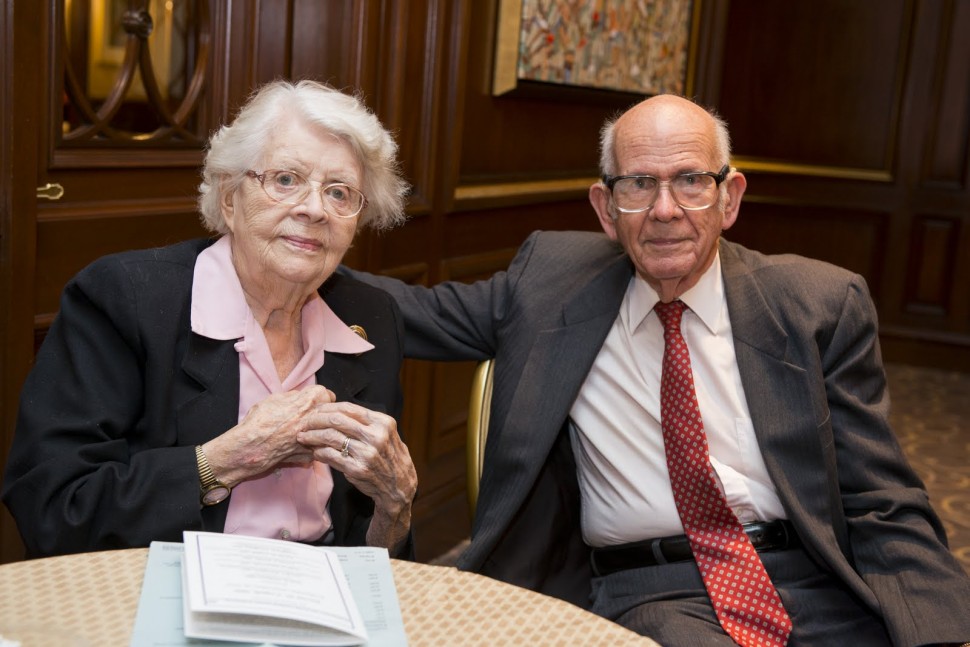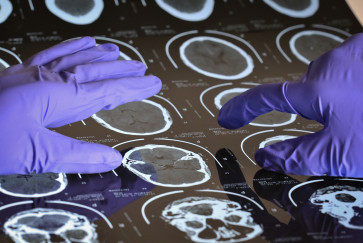David Cugell and Christina Enroth-Cugell spent almost their entire careers at Northwestern University. The University’s longest-serving faculty member, with a tenure of 58 years, Cugell was founding chair of the Division of Pulmonary and Critical Care Medicine at Northwestern University Feinberg School of Medicine. Serving on the faculty for 31 years, Enroth-Cugell was one of the first female professors to teach at Northwestern’s McCormick School of Engineering and chaired the Department of Neurobiology within the Weinberg College of Arts and Sciences.
During their lifetimes, the Cugells included the University in their estate plans, designating commitments to multiple areas. Upon their passing in 2016, Northwestern received planned gifts from the Cugells totaling $9.39 million.
The Cugells’ gifts will advance research in the areas to which they dedicated their life’s work by supporting Northwestern Ph.D. candidates, post-doctoral fellows and post-M.D. candidates working in those areas. More than $4.39 million will support candidates at Feinberg studying lung disease and more than $4.39 million will support Ph.D. students and fellows at The Graduate School studying visual neurosciences and biomedical engineering. Additional gifts will support other areas of the University.
“Christina and David blazed new trails throughout their careers at Northwestern, contributing to important milestones for our faculty and to science,” said Northwestern University Provost Jonathan Holloway. “Through their very generous estate gifts, they have extended this special legacy, and we are grateful for their support of the generations of fellows who will follow in their footsteps.”
The Cugells’ gifts, which count toward We Will. The Campaign for Northwestern, will have long-term benefits. The gift to Feinberg will provide researchers with funds for training that could have a significant impact on the pulmonary field.
“Dave Cugell was strongly committed to the training of young physicians and scientists in the area of lung disease,” says Scott Budinger, chief of pulmonary and critical care in the Department of Medicine and the Ernest S. Bazley Professor of Airway Diseases at Feinberg, who worked closely with Cugell on several projects toward the end of the longtime faculty member’s career. “He would be pleased to know that the fellowships he has provided will help to bring a new generation to this area and will further knowledge to improve the lives of patients with lung disease.”
The Cugells’ support also will allow The Graduate School to fund Ph.D. students studying at the intersection of biomedical engineering and visual neuroscience. Specifically, the gift will benefit those looking to improve the diagnosis and treatment of serious and widespread visual disorders that affect the elderly, such as glaucoma, age-related macular degeneration and diabetic retinopathy.
“The long-term goal of these researchers’ work is to prevent the loss of vision for people who have the potential to go blind,” says John Troy, professor of biomedical engineering at Northwestern Engineering, who was one of Enroth-Cugell’s post-doctoral fellows.
Enroth-Cugell was a role model for Teresa Woodruff ’89 PhD — dean of The Graduate School, associate provost for graduate education, and the Thomas J. Watkins Memorial Professor of Obstetrics and Gynecology — during Woodruff’s time in graduate school.
“It is an honor, as graduate dean, to enable this gift in Dr. Enroth-Cugell’s memory and enlarge our graduate studies to ensure new generations of Ph.D. students will continue to be touched by her legacy,” Woodruff says.
“Investing in Ph.D. education enhances Northwestern’s global eminence by educating future leaders and innovators,” she adds. “Ph.D. students and post-doctoral fellows bolster the research and scholarship enterprise of the University through the intellectual exploration, invention and discovery made possible by such generosity.”
The Cugells began their pioneering careers at Northwestern in 1955, the same year they were married. They spent most of the rest of their lives on the Evanston and Chicago campuses, becoming not only dedicated faculty members, but champions of the University.
“The Cugells supported Northwestern because it was their home for the bulk of their professional lives, and these gifts serve as a natural extension of their careers,” Troy says.
Christina Alma Elisabeth Enroth-Cugell earned a joint M.D./Ph.D. from the Karolinska Institute in Sweden, where she was a student of Nobel Prize winner Ragnar Granit, before moving to the United States to complete her post-doctorate at Harvard University. Enroth-Cugell was one of the first female interns at Passavant Memorial Hospital (the precursor to Northwestern Memorial Hospital). She first worked as a research fellow and instructor in Northwestern’s Department of Ophthalmology before transitioning to the role of faculty member in the Department of Physiology. Subsequently, she began a joint appointment at the Weinberg College of Arts and Sciences and the McCormick School of Engineering, becoming one of the first female faculty members to teach engineering at the University. Enroth-Cugell was a founding faculty member of what became McCormick’s Department of Biomedical Engineering and Weinberg College’s Department of Neurobiology, and she served as chair of the latter from 1984 to 1986. She died on June 15, 2016.
David Cugell earned a bachelor’s degree from Yale University and a medical degree from the Long Island College of Medicine (which merged with the State University of New York in 1950). He did his residency training at Albany Memorial Hospital in New York before serving as a U.S. Army medical officer in Korea and completing a research fellowship at Harvard University's Thorndike Memorial Laboratory, Boston City Hospital. Cugell was founding chair of the Division of Pulmonary and Critical Care Medicine at Feinberg. He also was a director emeritus of the Respiratory Health Association. Cugell died on December 5, 2016.
The Cugells were generous supporters of Northwestern throughout their lives, with 34 years of giving. Their previous giving included support for the University and The Block Museum of Art. They also were members of the Henry and Emma Rogers Society, which honors and recognizes alumni and friends who have included Northwestern in their estate plans.
The funds raised through We Will. The Campaign for Northwestern are helping realize the transformational vision set forth in Northwestern’s strategic plan and solidify the University’s position among the world’s leading research universities. More information on the “We Will” Campaign is available at wewill.northwestern.edu.


